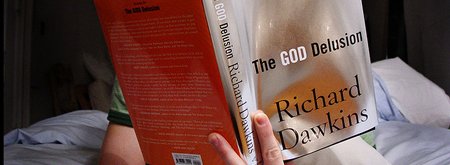Dawkins' Delusions: faith and evidence
When I settled down to read Richard Dawkins’ book, The God Delusion, I was surprised at just how much of his book I agreed with. And yet my view of the world is very different to that of Richard Dawkins. Something very strange seems to be going on here! It seems to me that Dawkins has been very clever in the design of his book. It is written very powerfully – the stories and illustrations he uses tend to persuade the reader to agree with him and by doing so it is easy to get drawn into believing that he is providing supporting evidence for his main thesis, that God is nothing more than a delusion. But rhetorical power does not equate to rational proof, and on the latter I am afraid the book is rather lacking.
Areas of Agreement
Religious extremism
One area where I found myself agreeing with Dawkins was in his reaction to the extremism that some religious believers can display. He gives many examples throughout the book of the inconsistent beliefs and inappropriate behaviour of those who call themselves religious. For example, he cites christian anti-abortionists killing doctors who perform abortions and Muslims who say “Behead those who say Islam is a violent religion”. We are all rightly appalled by these. But we need to ask a question – what do all these examples amount to? What does Dawkins actually show through them? My answer would be … nothing! He uses these examples to condemn religion as dangerous… but does it show that religion is not true? It would be like citing the case of Dr Harold Shipman, who killed many of his elderly patients, to argue that conventional medicine is dangerous and so should be avoided. The conclusion just doesn’t follow from the example.
Science, religion and evidence
Another area where I agreed with Dawkins concerns the relationship between science and religion. Some people argue that these subjects are completely different and separate, but Dawkins rejects this – and so do I. We both agree that evidence should be used to decide the truth of questions such as whether God exists or not. So, like a good scientist, Dawkins puts forward what he calls his “God Hypothesis”.[1] He states this as: “there exists a superhuman, supernatural intelligence who deliberately designed and created the universe and everything in it, including us.” I agree with Dawkins that if God does exist, then that fact would make a significant difference to the nature of the world in which we live – and that is potentially a scientific, or historical, matter – one in which evidence can be used to decide it. A God who made no difference to the world we live in is not really worthy of the name ‘God’. I can state that the world is full of invisible pink elephants, but if they never do anything, can never be detected, never interact with us, then the world might as well not be full of invisible pink elephants. It’s the same with God – he must make a difference to the world.
So I agree with Dawkins in his reaction to the extremist side of religion and in the value he places on evidence in determining truth.
Areas of Disagreement
Dawkins’ (mis)understanding of faith
Having agreed with Dawkins on the importance of evidence for evaluating religious claims, I expected to see a detailed analysis of the arguments that Christians and others use to justify their belief in God. I will look at his arguments in a moment, but Dawkins presupposes the outcome of this by a strange, one could almost say perverse, definition of ‘faith’. Dawkins states that “religious faith … does not depend on rational justification” and claims that religions demand “unquestioned faith”.[2] His implication is that religious belief is never based on evidence or perhaps that it exists despite the evidence. But because Dawkins discusses various arguments for God’s existence, he should be aware that religious faith can be based on argument. He may reject those arguments as false, but that does not change the fact that his own definition of faith is limited. Even if someone has a bad reason for believing in something like homoeopathy or acupuncture (perhaps because it seemed to cure their Aunt Mildred of her warts), they are not then accepting it unquestioningly – they just may not have looked at all the evidence or at the right sort of evidence. If I, as many others have done, decide that God is the best explanation of all the available evidence, then my belief, my ‘faith’, is grounded in fact.
The biggest concern here is that Dawkins has completely ignored the criticism of his definition of faith by Alister McGrath (in a book called appropriately Dawkins’ God). McGrath showed that Dawkins’ definition of ‘faith’ is not one that is shared by any major Christian denomination and indeed McGrath quotes examples that show completely the opposite view of what Dawkins says faith is.[3] But in The God Delusion, which Dawkins wrote after he had read McGrath’s book, Dawkins sticks rigidly to his original definition. One can only ask “Why?” Is he being naïve or mischievous or what?
Consider Dawkins’ likely reaction if one of his own students adopted a non-standard definition of a term like ‘natural selection’, just because it happened to suit them, but with no reference or source, and no justification of their definition. If Dawkins pointed out this error to the student, but the student went on to use the very same definition in his next essay and to draw some further strange conclusions from their invented definition, Dawkins would rightly question the student’s credibility. So why does Dawkins do exactly the same thing with his definition of faith? The only answer I can come up with is that Dawkins just doesn’t want to admit that religious faith can be reasonable, can be based on evidence and can therefore be adopted because it provides the best overall explanation of the whole of the facts and evidence around us. As so much of Dawkins’ criticism of religion revolves around his view of “blind faith”, to change this understanding would demand that he change, or at least seriously reconsider, his views on much else. I would simply ask… “How scientific is Dawkins being?” and I would answer… “Not very!”
Argument for and against God’s existence
So what arguments does Dawkins consider for and against God’s existence? He devotes a chapter to each of these issues and occasional other arguments crop up elsewhere in the book. These arguments supposedly deal with the issue shown in the book’s title, that God is a delusion – he does not exist. But the arguments used are very disappointing.
My disappointment lies in the fact that Dawkins totally fails to engage with and analyse the best arguments that are proposed for belief in God. There is so little real analysis that it is difficult to know where to begin. I will briefly consider here his discussion of just one of the arguments for the existence of God – that based on personal religious experience.
Dawkins states that such experiences boil down to nothing more than that the brain is good at interpreting external data, even random inputs like wind blowing through a keyhole, and making it into something meaningful. He cites a few personal examples of this. But he fails to engage with any detailed presentation of the argument by a religious believer. He assumes that the fact that one can explain some phenomena in one way means that that way must be correct. Just because all of the scientific data on the motion of objects up to about the beginning of the nineteenth century can be explained quite adequately by Newton’s Laws of Motion, that does not prove that Newton’s Laws are correct for all motion! Einstein showed that certain other data cannot be explained by Newton’s Laws and so relativity theory was born. All the data needs to be addressed, analysed and explained by a theory before that theory can be tentatively accepted. If another theory can explain the same data equally well, a decision needs to be suspended and other evidence will need to decide between them. The nature of personal experience does make it difficult to use as a convincing argument for those who have not had such an experience. But that does not change the fact that Dawkins’ explanation of one thing (the brain’s ability to guess at what a vague shadow might actually be) does nothing to undermine the validity of something completely different (an individual’s personal experience of God). Dawkins’ brief discussion is superficial and unscientific.
Dawkins’ main argument against the existence of God is based on evolution and what he calls his ‘Ultimate Boeing 747’ idea. He dismisses the idea that the universe could have been created and designed by a Supreme Being because that Being would need to be even more complex, even more intricate than the universe he created – in other words God would need to be even more complex than the laws of physics, or the human brain or a virus or a Boeing 747.[4] Dawkins argues that such a complex God explains nothing, because something else is then required to explain how such a complex God could himself arise. Now Dawkins draws his conclusion based on his own experience of the world and his belief that complex things can only arise from simple things through natural selection or the laws of physics. But even Richard Dawkins has no experience of things that occur outside of the known universe. It is just not valid to dismiss the possibility of a creator God in this way – and certainly something had to exist ‘in the beginning’ – even if it was just the laws of physics or the quantum singularity. Speaking as a physicist, I would say that the laws of physics themselves are hardly simple. Either that or I wasted a lot of time studying for my physics degree. Dawkins is like the eighteenth century Indian maharajah who stated categorically that it was impossible for water to support the weight of an elephant walking across a river. Of course, he had never seen ice – it was simply something that was completely outside of his experience of the tropical climate of India. In the same way, the possible origin of the universe is outside our direct experience, limited as we are to living within it.
God’s revelation in Jesus
But there is other evidence for the origin of the universe, although strangely it is an area that Dawkins barely acknowledges. This is strange, because many Christian apologists propose this as the strongest evidence for belief in God. For Dawkins to ignore it seems perverse at best, and reminds me of an ostrich at worst.
Consider the question: if God does exist, what sort of evidence would you look for to convince you that he does? The only thing I can think of that is really conclusive, rather than merely suggestive, is a direct intervention of that God in the world, in other words, a revelation. The Christian claim is that this is what happened in Jesus. The account of his life, death and resurrection in the gospels shows the sort of person that he is. The wisdom of his teaching, his compassion, the healings he carried out, his forgiveness of people’s sins, his claims to be God and the difficulty of satisfactorily explaining away the conviction in his disciples that he rose from the dead, can lead to no other conclusion than that he was who he claimed to be. Many have set out to disprove it but have foundered as they have looked more and more deeply into the facts.[5] Although Dawkins dismisses the New Testament accounts as untrustworthy he merely refers to nineteenth century biblical critics to back up his claim. Once again, he does not engage with the best of today’s evangelical scholarship showing the gospels to be reliable, better indeed by far than any other documents from a similar period. There is not room here to go into this topic – see articles under the ‘History and Jesus’ and ‘Resurrection and Miracles’ categories on the bethinking.org website for further details.
Each person needs to consider the evidence of Jesus’ life and death and ask whether it makes sense as a record of God’s possible revelation of himself. Could it possibly be God intervening in the world he created? Dawkins does not seem to be prepared to engage with this question, and we can only speculate as to the reason why. Science works on falsifiability. Theories are proposed and are tentatively accepted if there is supporting evidence and no circumstances can be found where the evidence doesn’t fit the theory. The challenge for Dawkins is to engage with the best of the arguments for Christianity – not a strawman of his own creation. Can Dawkins produce strong counter-arguments to undermine the authenticity and reliability of the gospel accounts and in particular of the resurrection of Jesus? If he truly engaged with these questions, that would be a book worth reading…
References
[1] Richard Dawkins, The God Delusion (Bantam Press, 2006), page 31.
[2] Ibid., for example pages 23, 306, 308. I would not say that belief in God must always have scientific or historical evidence to support it, but I do believe that there is good evidence for those who wish to consider it.
[3] See Alister McGrath, Dawkins’ God(Blackwell, 2004), pages 82-91.
[4] The God Delusion, page 114.
[5] For example, Frank Morison, Who Moved the Stone? (OM Publishing, 1983).



